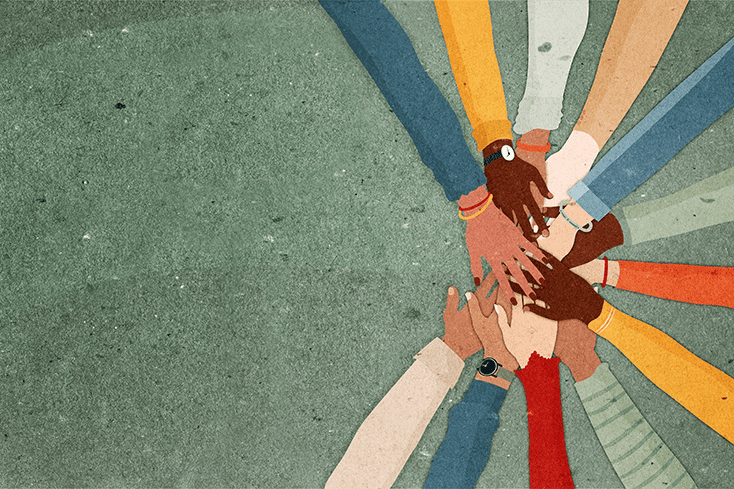May 15, 2023
By Caroline Helsen

I plugged in my phone, hit start on Google Maps and began the 57-minute drive from Brookline to Concord, New Hampshire. I was new to the state, having just moved there for my husband’s job, and was nervous for the long drive. Or was I nervous to share my story with a group of strangers who couldn’t possibly understand?
I made that drive, round trip, to NAMI New Hampshire’s office every Thursday for twelve weeks and cherished every moment with that group of strangers. We were there for the NAMI Family-to-Family program, a free educational course for family caregivers of individuals living with mental illness. Eager to learn more about my mom’s mental illness and become a volunteer for NAMI, I soaked up every bit of information from each class.
It didn’t take long for me to realize the other family members in the class did understand my story. It had been 18 years since my mom’s diagnosis of schizophrenia, so I was both comforted to finally hear parts of my experience echoed by other people and frustrated to realize others struggled with similar challenges.
Here are four lessons I learned that I hope make other family members and loved ones feel seen.
There are a lot of us out there, and even if you don’t think you know someone, you probably do. According to the National Institute of Mental Health, 14.1 million adults aged 18 or older in the U.S. live with a serious mental illness (SMI) — defined as those with a mental illness that causes “serious functional impairment, which substantially interferes with or limits one or more major life activities.” Now multiply 14.1 million by the number of spouses, children, parents, siblings, grandparents, friends and others who love someone with an SMI. We are here, and it’s important for us to share our stories — and for others to listen.
Early intervention is critical. According to NAMI, the average delay between when symptoms first appear and intervention is approximately 11 years. I came to understand that my mom may have experienced postpartum psychosis not long after I was born. Nine years later, my mom experienced postpartum depression and was eventually diagnosed with schizophrenia. “You don’t know what you don’t know” is a phrase we talked about a lot in class when someone learned a new piece of information that retrospectively could have helped them get better care for their loved one. While it was sometimes comforting, it was also a reminder that families deserve better. Programs and research that promote early intervention need more investment. My hope is that someday families will repeat the phrase, “we knew what we needed to know, when we needed to know it.”
Receiving an accurate diagnosis can be complicated. I hesitate often in sharing my story because it’s not a linear story, and the more I share, the more I feel the need to explain. Saying “my mom has schizophrenia” is succinct. But it’s not entirely accurate. Saying “my mom has schizophrenia, but I think it might be bipolar I with psychosis or schizoaffective disorder, and even though it’s been 23 years since her diagnosis, I’m still not sure,” is much more complicated. Especially when you feel compelled to share the ways in which our mental health care system is deeply flawed. Not to mention that people of color are disproportionately diagnosed with psychotic disorders compared to white individuals. But sharing these complicated stories is the point. It highlights the need for better provider training, patient education and access to quality mental health services.
It takes a village. The family members I met spoke of a similar feeling of responsibility as a caregiver. But it does take a village. No one can do it alone. Research shows social connectedness is an important component of mental health. Whether or not you think of it as a village or passing the baton in a relay race, you are not alone and you can accomplish more as a team. Siblings of children with a mental illness and children of parents with a mental illness can build resiliency and receive support through a community of trusted adults. I had many trusted adults in my life, including an elementary school teacher, who had an immense positive impact on my life.
I continue to be grateful for those trips to Concord, the people who shared their stories and the NAMI volunteers who facilitated an incredible learning experience. However frustrating it was to hear that others struggle with similar challenges, I now know that frustration points to a more important truth — a better world is possible for our families. A world where all family members feel understood and know they are not alone in their experience. A world where it is possible for loved ones to receive timely, accurate, comprehensive mental health care. A world where there are not one or two people supporting your family, but an entire village.
Caroline Helsen volunteers as a NAMI Family-to-Family facilitator, where she helps other family members learn about their loved one’s mental illness. A current graduate student at the Yale School of Public Health, Caroline will graduate with her MPH degree in May 2023 and focus her career on supporting families through public health policy and programs.
We’re always accepting submissions to the NAMI Blog! We feature the latest research, stories of recovery, ways to end stigma and strategies for living well with mental illness. Most importantly: We feature your voices.
LEARN MORENAMI HelpLine is available M-F, 10 a.m. – 10 p.m. ET. Call 800-950-6264,
text “NAMI” to 62640, or email. In a crisis, call or text 988 (24/7).